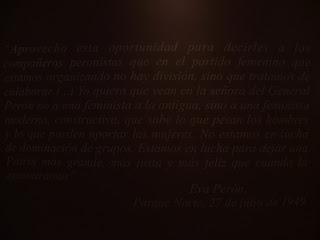A bit about Evita: she’s the most famous woman in Argentina, and was a far more important force than her husband, the president at the time. Evita was born poor, became a mediocre actress and was involved in social activism. She met Colonel Perón, married him, and became the soul of Argentina. She was an incredibly influential first lady in a time when women had no political say.
The museum was extremely positive in its representation of her, but there were occasional hints of a undercurrent of dissent. One display mention briefly that when Evita used her health as an excuse not to run for vice president, those who hated her would post up the slogan, “Long Live Cancer!” Never did the museum mention why anyone would hate her.
I’ve been asking others for their opinions on Evita. One host person very diplomatically noted that she was an interesting person who pioneered women’s rights. The doorsman from earlier admired Evita’s work to alleviate poverty and felt porteños, tending to be rich, disliked Evita for her emphasis on the poor. A fellow (U.S.) student told me Evita organized police squads to ruthlessly repress anyone who spoke out against her or her husband, Perón, and perhaps that’s why she’s disliked.
But now, the museum. Before he was president, Perón was a colonel and head of a governmental department involved with workers, among other areas. However, for reasons the museum stayed vague on, he annoyed many people in the government and was arrested. Workers, terrified that their support systems would be lost, rallied in mass to demand his release. It’s an interesting parallel to current fears of losing the support systems Cristina has made. When in office, Perón transformed October 17th, the day he was freed from prison, into a holiday called Loyalty Day, on which he and Evita would give speeches to the masses.
Despite this, Evita was what made Perón stand out. She was beloved to the point of near sainthood, and it’s her policies his terms are known for. Around 1948 or 1949, Evita made many social rights part of the Constitution for the first time. This included rights for children, the elderly, workers, education, and health. It was also the first time social aid had been extended to all areas of the country.
In addition the classic orphanages and schools, Evita had several very novel creations. One included a children’s touristy program that organized and funded visits to the ocean or other areas, allowing poor children, orphans, and abandoned kids to see new sites. Evita also created a foundation dedicated to aid to other countries, an interesting choice for someone already trying to make many changes to her own country. The museum had several book displays explaining what rights people deserve. The elderly have a right to moral health (the picture showed an old folks home with a library), and kids have a right to love, because “children are of God and are the fruit of love”. I don’t know what of these actually translated to law, because it certainly sounds impossible to enforce and hard to support.
In regards to feminism, Evita struck the perfect note. One of Evita’s causes was winning voting rights for women (she succeeded). In discussing it, she said, we women aren’t in a fight for dominance with men, we just want the chance to help our country too.
Among the museum’s odd displays were a selection of photos of Evita’s hands in different positions and several propaganda filled children’s books. I’ll translate two for you:
1.
“In an old book of stamps, Magarita admired marvelous landscapes. Mountain ranges, woods, beaches, snow. How beautiful it would be to have a vacation in one of these places! Enthusiastically, she showed the book to her mom, and asked when they would visit these sites; the woman, saddened, responded, “Workers can’t travel because we don’t have money.”
Fortunately, this occurred a long time ago, because now, since Evita created the Foundation, all Argentinean workers have holiday camps in mountain ranges and beaches where they can have fun, together with their families, on their well deserved vacations.”
2. My favorite, it’s titled “Love Is Repaid With Love.”
“How tenderly the mother rocks the baby” commented Miss Clara.
“And how lovingly the child holds out its arms!” responded Lucia.
“Love is repaid with love!”
Our homeland also had a mommy that rocked with her unlimited kindness: Evita!
She completely sacrificed for and loved her town, and her town returned her love.
Love is repaid with love!”
In the years after her death, Evita’s body was moved four or more times, in attempts to keep it safe from those who hated her. In 1957 her body was interred in Italy under the false name “Maria Maggi de Magish” and now it resides in Recoleta, my neighborhood.





No comments:
Post a Comment